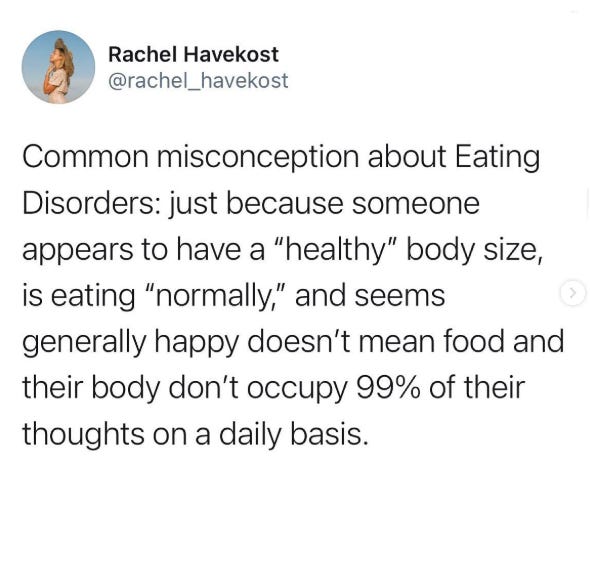5 Unconventional Truths About Eating Disorders You Need to Know
Whether you struggle with an eating disorder or not, chances are someone in your life is, and these five truths could help you (and them).
Hi Pretty Humans,
Today is World Eating Disorder Action Day, and as someone who has been battling an Eating Disorder for 20 years, here are 5 unconventional actions I wish I’d known about when I was first diagnosed.
If you’re new here, HI! I’m so glad you’re here. My name is Rachel, and I’ve been sharing my experiences with mental illness, grief, and life as a single 36-year old for the last five years. Ok, so I guess as a single 31-36 year old. At this point I just tell people I’m 29 because I really like to imagine Schmidt from “New Girl” saying “29” to pump me up. If you’d like to support my work, it would mean so much if you became a paid subscriber (only $5/month). If that’s not in the budget that’s ok! There is a free subscribe option, too.
1. People with Eating Disorders might not be struggling with food
We often associate eating disorders with, well, eating. The truth is, there is often an overlap of anxiety, depression, or PTSD. Many folks who are diagnosed with an eating disorder may not seem to present with what we perceive or classify as severe food-related symptoms: they may be struggling with social anxiety and fitting in, how their body experiences intimacy, or feeling worthless/losing hope.
2. Someone can be in remission & still have symptoms
Just because someone has been to treatment & is technically "in remission" (they no longer meet diagnostic criteria for an ED) doesn't mean they won't experience symptoms. Think of it this way: if you broke a bone, you'd wear a cast for a period of time & perhaps go to physical therapy to rehab. Even though the bone is no longer broken, you'd still have weakness, pain, & be more vulnerable to re-injury. The same is true for ED recovery.
Read more about my experience in treatment and relapse here:
3. Anybody--and I mean any BODY (size, age, gender, race) can have an Eating Disorder
There is more awareness around this now but eating disorders do not present in any specific body alone. You do not need to present physically in any certain way to get the help you deserve. Someone you love might not be what you stereotypically have seen in media as someone with an eating disorder, but that doesn't mean they aren't struggling.
4. The most loving thing you can do for someone who is struggling is educate yourself
Educating yourself on your loved one's mental health condition is the ultmate act of support: it says, "I know you're exhausted, I know this is real, and I'm going to spend time learning about it so I can advocate for and with you, and we are going to fight this thing together."
5. Eating Disorders are not just restricting/bingeing/purging
It's hypersensitivity to how something feels against our skin. It's fixation on the tiniest detail to the point of unravel. It's being convinced that one small mistake will end us. It's the fear of getting older & hating ourselves for caring. It's wanting love but not having the tools to experience it. It's all consuming, & sometimes we just wish others understood us so we didn't have to explain ourselves ever again.
📚read more about my eating disorder my memoir, “where the river flows.”

As someone who has been in treatment twice and therapy for 20 years for my own Eating Disorder, I can honestly say this has been the most stigmatized, misunderstood, and exhausting battle of my life.
I would like to think that one day I will be free from the voice/symptoms/urges/constant reinforcement around me to look a certain way. Maybe I will--maybe I won't. I am more free now than I've ever been, and, I'm still in ED prison.
I've learned SO MUCH in therapy on how to manage my stress, anxiety, grief, insecurity, and just life in general in other ways, and, I still hyper-fixate on my appearance, dissociate during intimacy/intentionally check out with substances, avoid certain situations for fear of being seen, get uncomfortable with vulnerability (my own), and panic when I lose control. I'm still a person, and, I'm still handcuffed to my eating disorder.
If you're struggling, please know you're not alone--whether this is your umpteempth year fighting or you're just beginning the recovery journey. It does get better, and, it will still be hard. No matter WHAT, you are not on the path alone, and I love the crap out of you for trying.
I love you little messy gremlins.
I am so eternally grateful you are here. Without you my writing means nothing, and you keep me going. I could not be here today if it weren’t for your support, readership, and shared vulnerability. Thank you from the bottom of my heart.
All my messy love,
Rach
You can read chapter one of my book free here.
Download my free guided journals here.
Take my Writing Masterclass here.
If you need ED-specific support, here are some resources:
@NEDA for information
@alliancefored hotline: 866-662-1235
📚my memoir, “Where the River Flows” to feel less alone
If you’re not yet convinced to be a paid subscriber, here’s a 7-day trial:
Take your time reading the archive once it’s unlocked in your trial and see if the Full Mess is for you. Whether it is or not, know that I fully love your mess, and am so glad you’re here.









Thank you for your vulnerability. I feel so seen after reading this. You're definitely not alone. Recovery is hard, but so worth it. ❤️🩹🫂
i just created my acc how did it know i have an ed😭